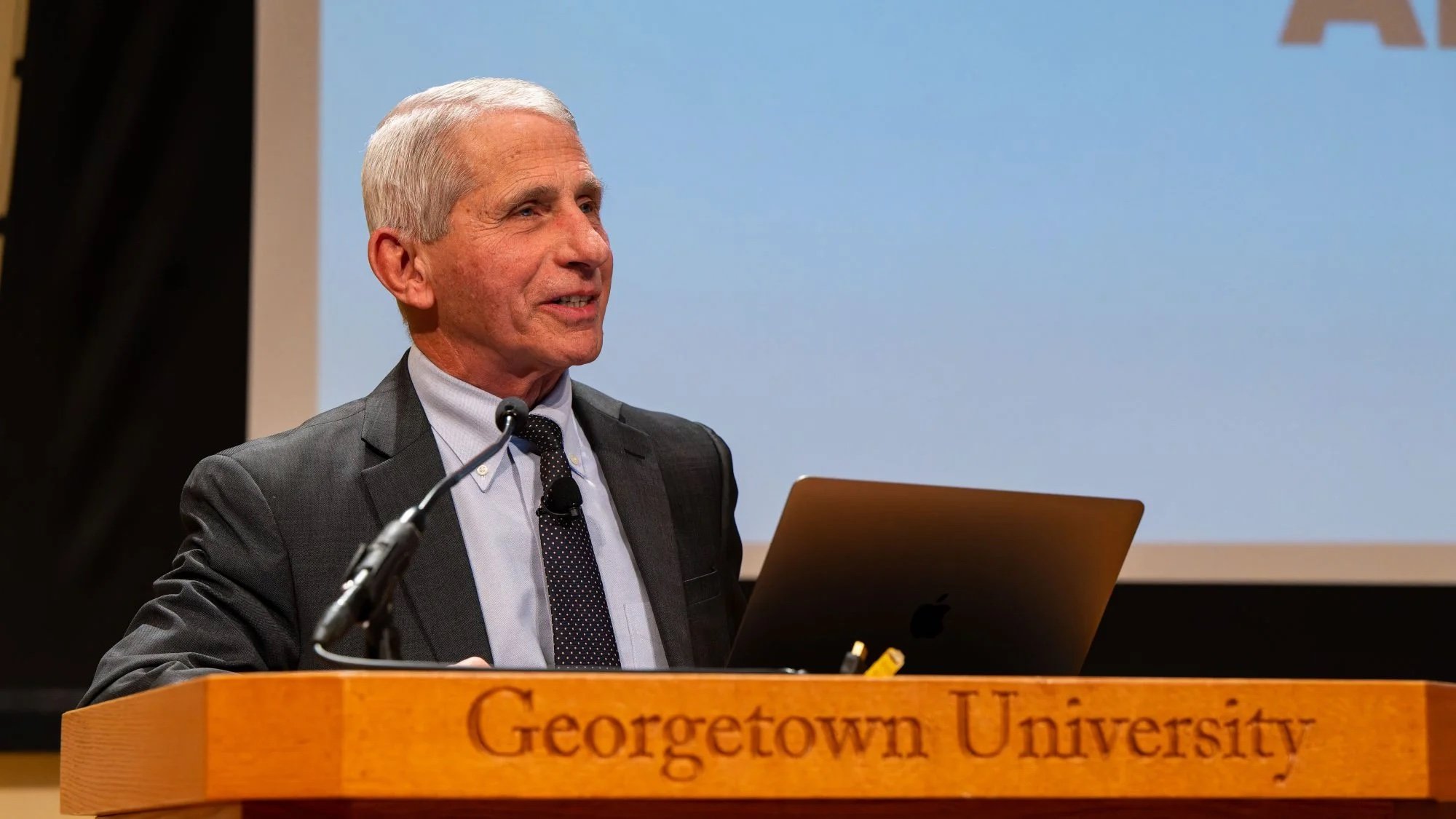Pandemic Preparedness with Dr. Fauci: This Year’s Whittington Lecture
Photo via Georgetown University
AYUSHI DAS: On February 1st, in a joint event with the McCourt School of Public Policy, Georgetown University welcomed Dr. Anthony Fauci at Gaston Hall to present this year’s Whittington lecture. The Former Chief Medical Advisor to the President of the United States presented an engaging, informative lecture titled “Pandemic Preparedness and Response: Lessons from COVID-19”, discussing health politics and vaccinology with an audience of students, faculty and guests.
As previously credited with co-founding solutions to HIV, Dr. Fauci holds an impressive background in vaccine development amidst polarizing climates, where health issues became widespread debate. He touched on this throughout his lecture, as he outlined ten lessons to learn from COVID-19 in the face of future public health crises.
He opened the lecture with a discussion of COVID-19’s unique RNA sequences that created such contagious pandemic fuel in the first place. Unlike most respiratory viruses, COVID-19 can linger in the air, posing a contagious risk in pre-symptomatic or asymptomatic individuals. Alongside this, a lack of solid preventive strategies and global collaboration amalgamated into a widespread clash of conflicting politics that ultimately claimed the lives of almost 14.9 million people.
Dr. Fauci continued the discussion with a breakdown of the rapid vaccine development timeline, explaining how his team converted pre-existing clinical trial infrastructure for AIDS into COVID-19 centers and sped up the process. Four HIV clinical networks were converged and reformed to become COVID-19 vaccine test centers, making clever use of pre-existing facilities, volunteer bases, and vaccinologists. Collaboration, extensive research and a period of trial and error birthed the first COVID vaccination in less than a year, according to Dr. Fauci, and the United States was amongst the first nations to receive it. Yet media wars in the US left 78% of Americans unsure of pandemic facts and unwary of the vaccine.
“232,000 deaths could have been prevented among unvaccinated adults,” Dr. Fauci exclaims with frustration. “[Misinformation] was a public health tragedy.”
Perhaps the most striking lesson from Dr. Fauci’s lecture was his emphasis on the environmental and social revelations of the pandemic. The COVID-19 virus originated in illicit animal trading markets in Wuhan, China.
“Unbalanced interactions with nature,” Dr. Fauci warned, “will increasingly provoke new disease emergencies.”
And it’s true; the last major pandemics resulted from invasive interactions with the animal kingdom. Dr. Fauci also spoke about the geopolitics of land resources, emphasizing that pathogen exposure in humans can be significantly decreased by straightforward solutions like halting tropical deforestation and improving water safety.
Systemic barriers in global healthcare systems also create an inequitable stream of access to vaccinations and prevention strategies during the height of the pandemic, Dr. Fauci presented. For example, Israel severely restricted the flow of vaccinations into the then-recognized areas of Palestine and the Democratic Republic of Congo still only has a 5% vaccination rate compared to powerhouses like Canada with 88%.
But even in “developed” nations, similar systemic barriers claimed the lives of millions. Dr. Fauci disproves the idea of progressive Western medicine stating that with the exception of a few countries, the United States had the worst death rate per capita for COVID-19. He pointed to various factors at play causing this death rate. The racial dynamic of domestic healthcare puts Black, Hispanic, and Indigenous populations with the lowest vaccination rates compared to non-Hispanic White and Asian people. In addition, the rise of American polarization during topics of federal invention adds to whirlwinds of conflicting news opinions leading to a lack of direction in terms of funding, in this case, healthcare.
“We are living in an era of the normalization of untruths,” Dr. Fauci said sadly as he concluded his lecture, “And if truth has no value, then science falls apart.”
As we move into a new year of the COVID-19 crisis it is important to note that while life may appear seemingly normal again, there are still hundreds of new COVID-19 cases and related deaths that are reported to the World Health Organization each day. Climate justice, international development, and media politics are interwoven into the public health crisis – topics that must be addressed in discussions about future pandemic preparedness in global health and epidemiology. Given the abnormal DNA composition and mutative behaviors of the virus, COVID-19 is here to stay for a while, hence why it is more important than ever to remain vigilant and mindful of symptoms and contamination. Because just like Dr. Fauci reminds us in simple terms “It ain't over till it’s over.”
You can read further into Dr. Fauci’s 10 lessons here.
Ayushi Das is a freshman staff writer in the Georgetown College of Arts and Sciences studying government and sociology. She has an interest in the role of storytelling in political discourse.

